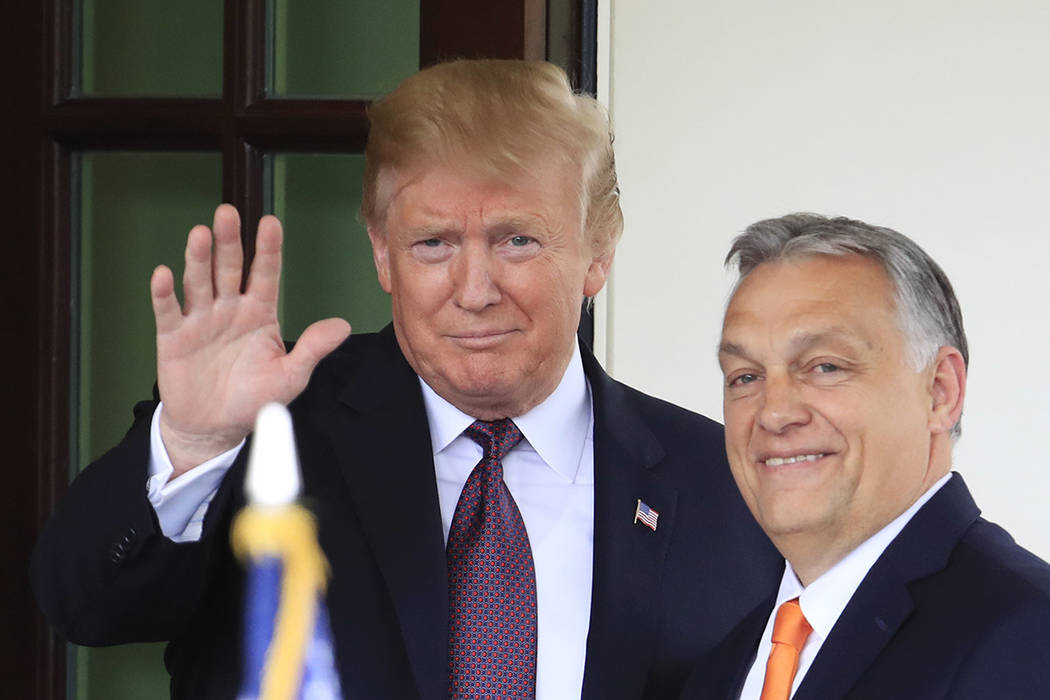China, Trump escalate trade war as stocks slide

WASHINGTON — China raised tariffs on $60 billion worth of U.S. imports Monday, leading President Donald Trump to respond with a series of salvos on Twitter that warned the trade war will only get worse.
China’s decision to raise tariffs levied on targeted U.S. goods and agriculture starting June 1 followed the Trump move to raise tariffs on $200 billion of Chinese products from 10 percent to 25 percent announced last week.
Trump also blamed China for backing down from a deal that was “95 percent there” when the Chinese government informed Treasury Secretary Steven Mnuchin and U.S. trade representative Robert Lighthizer the deal was off.
Last week Chinese Vice Premier Liu He said he believed it is irresponsible for one party to accuse the other of “backtracking” while the two sides were still negotiating.
“We’re in a very strong position,” Trump told reporters as he met with Hungarian Prime Minister Viktor Orban in the Oval Office Monday afternoon. “Our economy has been very powerful. Theirs has not been.”
Stock prices tumbled as the uncertainty of the prospect of a trade war between the planet’s two largest economies spooked investors. The Dow Jones Industrial Average dropped 617 points, or 2.4 percent, and tech stocks like Apple got hit the hardest.
Rather than appear to soften his posture, Trump threatened to raise tariffs even more when he told reporters, “We have another $325 billion that we can do, if we decided to do it.” Lighthizer’s office released a list of Chinese goods worth some $300 billion to start a comment process to raise the levy on those goods to 25 percent.
The president also said that the higher tariffs would result in “a tremendous amount of money that would come into our country.”
Tariffs means more money?
Trump has tweeted that the United States collects “over $100 billion a year in tariffs,” but as FactCheck.org has reported, the Congressional Budget Office puts the number closer to $74 billion in the current fiscal year. As Trump himself noted, his tariffs could drive manufacturers to move their operations to other low-cost countries like Vietnam — which would put a dent in China’s profitability, but would not result in higher tariff revenue.
While Trump insisted that China, not U.S. consumers, would shoulder the pain that his increased tariffs imposed on Chinese goods, his own National Economic Council chief, Larry Kudlow, admitted on “Fox News Sunday,” that both China and the United States “will suffer on this.”
A paper for the London-based Centre for Economic Policy Research estimated Trump’s tariffs reduced real U.S. income by $1.4 billion per month last year.
The D.C.-based Tax Foundation estimates that the tariffs imposed and threatened under Trump to date would reduce gross domestic product by 0.21 percent, wages by 0.13 percent and eliminate 161,751 full-time jobs.
Even Trump recognized that China was likely to retaliate against U.S. farmers. Not to worry, Trump said, as the federal government would allocate “a small portion” of tariff revenue to U.S. farmers “until such time as it’s all straightened out.”
The group “Tariffs Hurt the Heartland,” protested, noting, “Farmers, low-income consumers and small businesses will be disproportionately impacted at a time when every sale and every dollar counts.”
Changing GOP view
While the modern Republican Party’s philosophy generally has supported free trade, elected GOP officials have warmed to Trump’s argument that China “has taken advantage” of the United States for decades, and only harsh measures can steer Beijing toward fairer trade and away from its practice of appropriating U.S. intellectual property.
Sen. Marco Rubio, R-Fla., has praised Trump for becoming the first administration in modern history “that’s actually taken these guys on.”
Trump also has found support among Democrats. When the president announced he would raise some Chinese tariffs to 25 percent, Senate Minority Leader Chuck Schumer, D-N.Y., took to Twitter to urge Trump to “hang tough on China.”
“I’m concerned that these tariffs could threaten our economy, hurting American businesses and increasing prices for consumers,” Sen. Jacky Rosen, D-Nev., said in a statement. “There are thousands of jobs in Nevada that depend on trade, including our thriving solar industry.”
Former Vice President Joe Biden, the leading candidate in the 2020 Democratic primary, took issue with Trump’s focus on taking on China, an economic rival, Biden said, “that is not competition for us.”
Trump also made news when he announced that he would have “probably a very fruitful meeting” with Chinese President Xi Jinping in late June at the G20 meeting in Japan, as well as meet with Russian President Vladimir Putin at the Osaka summit.
Contact Debra J. Saunders at dsaunders@reviewjournal.com or 202-662-7391. Follow @DebraJSaunders on Twitter.